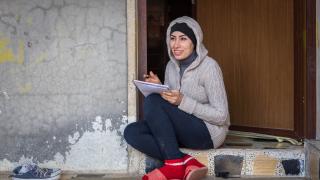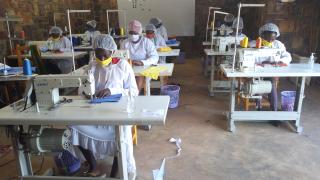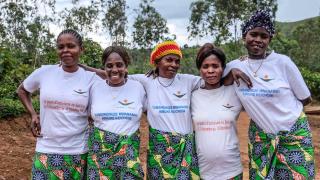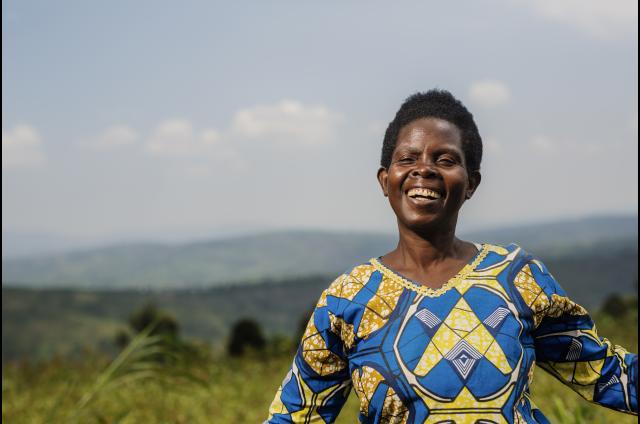How Did Women Get Through 2020? Together.
Thank you for being part of a year in which women survivors of war have led their families and communities through unprecedented hardships and uncertainties, towards a brighter future.
As we begin the new year, here is a look back at what we achieved together. With your help, we were able to:
- Distribute over 100,000 masks to help protect people from disease
- Distribute more than 5,900 hygiene kits
- Reach more than 18,000 women when they needed support most
Together, we wove a network for women living at the intersection of violent conflict, disease, poverty, and gender discrimination, during a time that tested our spirits.
Our global team and programme participants wanted to share a thank you message with you. Watch the film.

Conflict Continued
Even before COVID-19 struck, 2020 started with conflict. Tensions continued in Afghanistan amidst peace talks. Iraq dealt with spillover from the US-Iran missile attacks. Thousands more women and their families dealt with a resurgence of violence in Syria, that exacerbated the refugee crisis in Iraq.
Despite these setbacks, staff kept doors open so women could access support and gain skills to rebuild their communities after conflict — and that kept them safe during a global crisis.
Like much of the world, we had to be distant from those we care about. Across all of the country programmes, classes were suspended as the pandemic spread across the world to protect the health of women we serve and their families.
But COVID-19 also came with many other threats towards women, who were on the frontlines of the disease as caretakers. Women were more at risk of losing their livelihoods and forced into shutdowns at home with their abusers.
We remained committed to reaching women, no matter where they were, even from afar. As classes dismissed and dispersed, staff refreshed women on information about their health and hygiene. Staff set up communication trees so women could form support networks to keep track of each other’s situations and safety.
In South Sudan, the Democratic Republic of the Congo, and eventually Nigeria, staff took to radio airwaves to continue delivering updates and health information about the pandemic from afar, using one of the most popular and trusted forms of communication in local communities. Where women had reliable access to cellphones or could access money remotely, like Rwanda and Nigeria, teams set up mobile money transfers. Women would be able to continue receiving their stipend during a health crisis with deep economic consequences.
Stricter lockdowns and surging cases kept women in Iraq apart longer. Knowing that women needed support now more than ever, the team turned the mobile groups they set up on Viber and WhatsApp into online trainings. Because literacy is a barrier for many participants, the team is constantly innovating solutions, such as using voice recordings.
Besides staying connected, we helped women access resources to protect themselves and their families. For countries where women couldn’t access mobile money, teams set up safe, socially distanced, masked distributions.
In South Sudan, these distributions also included soap. The Afghanistan team organised a large effort to distribute hygiene kits that included toilet paper, gloves, hand sanitiser, soap, masks, and pamphlets to educate women about the disease.
Many women who were beginning to work on agriculture were also able to receive crops to grow and sell before the pandemic hit. In the DRC — where the Ebola crisis means many are familiar with highly infectious diseases — women received support to produce soap so communities could practice proper handwashing habits.
Yet many people in the communities we serve still struggle to access accurate health information due to barriers such as low literacy rates combined with disabilities.
The South Sudan team partnered with Disabled Action Group to conduct COVID-19 trainings for disabled people, including delivering information in sign language.

The Ripple Effect
Despite the setbacks, women found courage this year in themselves and in each other. They used their power to protect their families and communities.
Across many of the Women for Women International programmes, participants received masks or materials to make masks, which they then shared or sold in their community. The Women’s Opportunity Center in Rwanda was an example of a large-scale mask-making effort, producing over 80,000 masks, while helping women earn a livelihood.
Women used their voices to become leaders. The local government in one Nigerian community recognised the strength of the Change Agents, and invited them to join efforts to educate localities. Change Agents used their advocacy skills to demonstrate proper disease prevention with their speakers and truck as they travelled to surrounding communities.
In the DRC, women conducted similar activities. Change Agents in Afghanistan also advocated with local government officials to secure resources and trainings to combat COVID-19. But they also protected each other and women around them as they held awareness trainings to teach women about their rights and how to defend them.

Coming back to the classroom
In many places we serve, in-person classes have resumed so women can come back together to build connections and the power to transform their lives.
And excitingly, the research proves it works: We wrapped up a large study in the DRC that showed graduates of the programme are increasing their earnings and savings, providing better food for their families, and have improved confidence and agency to determine their paths.

